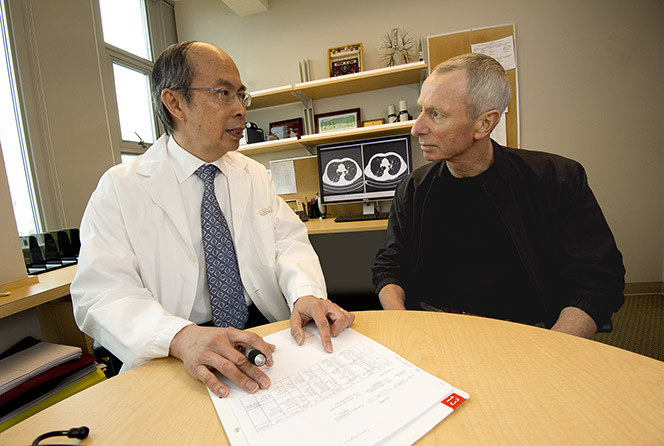
Dr. Stephen Lam (BC Cancer Agency, Vancouver) , principal investigator of the Terry Fox Research Institute’s Pan-Canadian Early Lung Cancer Detection Study , speaks with Vancouver-site study participant and resident Mr. Chris Douglas, 65, who had a cancerous nodule surgically removed in 2011 after it was detected on a CT scan taken during the study. Photo credit: BC Cancer Agency.
June 27, 2013
Study extended to June 2015
The Terry Fox Research Institute and partners inject $1.5 million into national lung cancer study to answer additional key questions about screening high-risk individuals
Vancouver, BC –
The Terry Fox Research Institute, Lung Cancer Canada, the Princess Margaret Hospital Foundation, the BC Cancer Foundation and site partners are injecting a total of $1.5 million into TFRI’s pan-Canadian study to detect early lung cancer so investigators can determine how frequently, and for how long, individuals at high risk for lung cancer should be screened.
TFRI is providing up to $1.3 million to the project with contributions of $100,000 from Lung Cancer Canada, $61,900 from the Princess Margaret Hospital Foundation and $48,300 from the BC Cancer Foundation. The funding will enable the national Early Lung Cancer Detection Study’s clinical investigators to offer a third screening CT scan to its 2,500 study participants four years after their first low-dose CT to provide additional information on these two key screening parameters. The study will be extended to June 2015 from its current June 2013.
“There is a unique window – really a one-time opportunity – for our investigators to gather this data from a very select cohort of high-risk individuals to fill what is currently a gap in knowledge. We will not have this information if the cohort disbands now. TFRI is extremely grateful to our partners for their funding to support this new aspect of the study. We anticipate it will contribute to important recommendations about a potential screening program, its benefits and its costs,”
said Dr. Victor Ling, TFRI president and scientific director.
“Our public opinion polls have found overwhelming public support for a national lung cancer screening program in people at high risk,”
said Dr. Natasha Leighl, president of Lung Cancer Canada. “Lung Cancer Canada is proud to support this important research, which will help us to implement lung cancer screening in the safest, most cost-effective way possible. Timely, low-dose CT screening of high-risk populations will represent a major step forward in the fight against Canada’s leading cancer killer, sparing the lives of thousands of Canadians annually and offering hope where, previously, there was only worry and despair.”
TFRI’s national, $7.16 million, five-year study (2008-2013) is co-funded by The Canadian Partnership Against Cancer (CPAC) and is focused on the effectiveness of a web-based risk assessment model and simple breath and blood tests as a first step for detecting early lung cancer. To date, 4.6% of the participants have been diagnosed with cancer.
“I’ve been receiving CTs annually since I first joined the study in 2008. I don’t think it’s an exaggeration to say that my participation in the study saved my life,”
said Vancouver resident and study participant Mr. Chris Douglas, 65. He had a cancerous nodule, detected on an early CT, surgically removed in 2011. Today, he is an active swimmer and grandfather of two. The former smoker quit when he joined the study.
“We already know our study is helping to save lives. This additional funding will enable us to collect and analyze new data that will help us to evaluate screening for individuals with high risk. It will also allow data from our study to more easily be compared with current studies already published, such as the National Lung Screening Trial,”
said Dr. Stephen Lam, a lead investigator of the study, who is chair of BC’s Provincial Lung Tumour Group at the BC Cancer Agency and a professor of medicine at the University of British Columbia. “We believe this new information will, potentially, save more lives and provide the health system with relevant economic data for the development of an effective and affordable way to implement a national screening program.”
The U.S. study found that low-dose CT scans were effective in reducing lung cancer mortality by 20 per cent in a similar high-risk group.
Currently, eight cities are involved in the Canadian study: Vancouver, Calgary, Hamilton, Toronto, Ottawa, Quebec City, Halifax and St. John’s. All will participate in the extended study. No new participants are being recruited.
Preliminary study findings are expected within the next year.
About TFRI
Launched in October 2007, The Terry Fox Research Institute is the brainchild of The Terry Fox Foundation and today functions as its research arm, managing its complete research investment portfolio. TFRI seeks to improve significantly the outcomes of cancer research for the patient through a highly collaborative, team-oriented, milestone-based approach to research that will enable discoveries to translate quickly into practical solutions for cancer patients worldwide. TFRI collaborates with over 50 cancer hospitals and research organizations across Canada. TFRI headquarters are in Vancouver, BC.
www.tfri.ca
About LCC
Lung Cancer Canada is a national charitable organization that serves as Canada’s leading resource for lung cancer education, patient support, research and advocacy. It is the only organization focused solely on lung cancer in Canada. For more information on Lung Cancer Canada, please visit
www.lungcancercanada.ca.
Note to editors:
B-roll (includes interviews) and photos of Dr. Lam and Mr. Douglas are available at www.tfri.ca
Mr. Douglas is available for interviews between 1-2 p.m. PDT on Thursday, June 27 at the BC Cancer Research Centre. Please contact K. Curwin to arrange.
Backgrounder available
For more information, contact:
Kelly Curwin, Chief Communications Officer
Terry Fox Research Institute, Vancouver BC
W: 604-675-8223
C: 778-237-8158
kcurwin@tfri.ca
Arielle Densen
Lung Cancer Canada
T: 212-358-8515, ext.5
adensen@tillerllc.com
Alison Colina
BC Cancer Foundation
T: 604.802.6984
allison.colina@bccancer.bc.ca